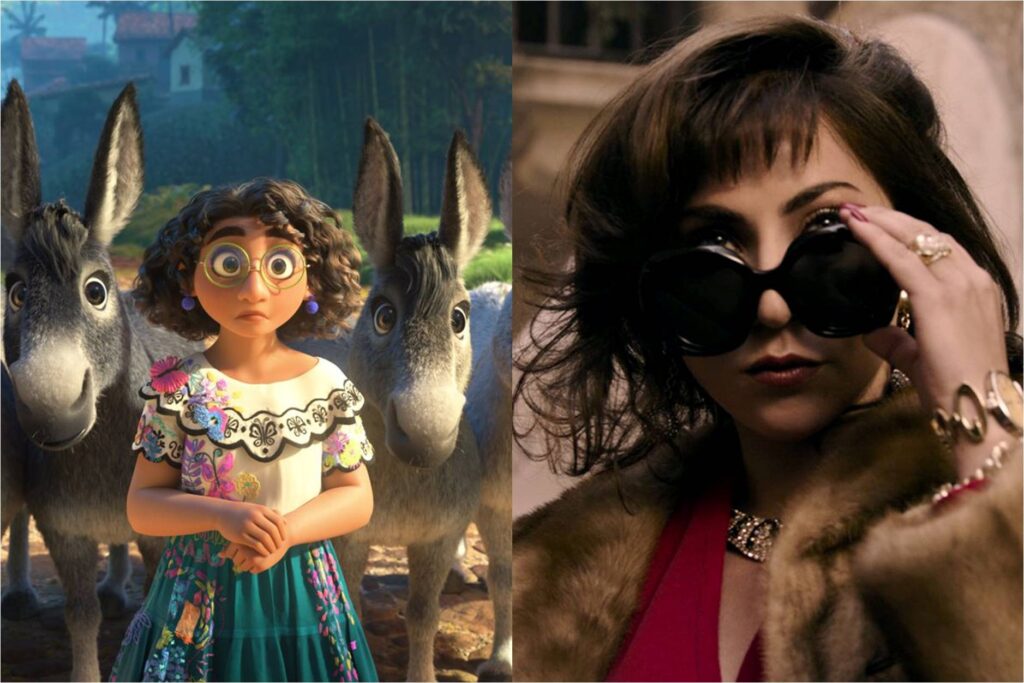
The double feature is a long-defunct relic of moviegoing, but lately I’ve done my best to revive the concept in my writing, if only to give myself the excuse to review as many films as possible. But while I’ve previously managed to contort unrelated movies into purportedly similar shapes—Dune and The French Dispatch are both made by obsessive world-building auteurs, King Richard and Tick Tick Boom both contemplate tortured geniuses, Malignant and The Card Counter both go for broke, etc.—this Thanksgiving’s pair of high-profile releases presents a more daunting challenge. How to possibly unify Encanto, the cheery new animated musical from Disney, with House of Gucci, Ridley Scott’s sordid fact-based saga of opulence, betrayal, and murder? I could argue that both films center on crumbling dynasties who cling to their power through deceit and corruption, but let’s not kid ourselves—not when one of them is geared toward kids and the other toward creeps. Instead, let’s focus on their qualitative differences, because one of these movies is quite good and the other one isn’t.
Conceptually speaking, Encanto isn’t anything special. Directed by Jared Bush and Byron Howard (Zootopia) from a script Bush wrote with co-director Charise Castro Smith, it’s another of Disney’s misfit-kid pictures, centering on a plucky heroine who, despite her wholesome spirit and positive attitude, is unsure of her place in the world and within her family. Of course, world and family are essentially the same thing for Mirabel (voiced by Stephanie Beatriz), who technically isn’t a princess in the same way Moana technically wasn’t a princess. She’s nonetheless the granddaughter of Alma (María Cecilia Botero), the benevolent matriarch who rules over her brood, the Madrigal family, with what might be called generous rigidity; everyone is happy, so long as—and perhaps because—everyone abides by Alma’s decree. There is even something vaguely feudal about the Madrigals’ elevated position; they’re basically aristocratic leaders of a humble South American village, one whose welfare hinges on the noble class’ prosperity and munificence.
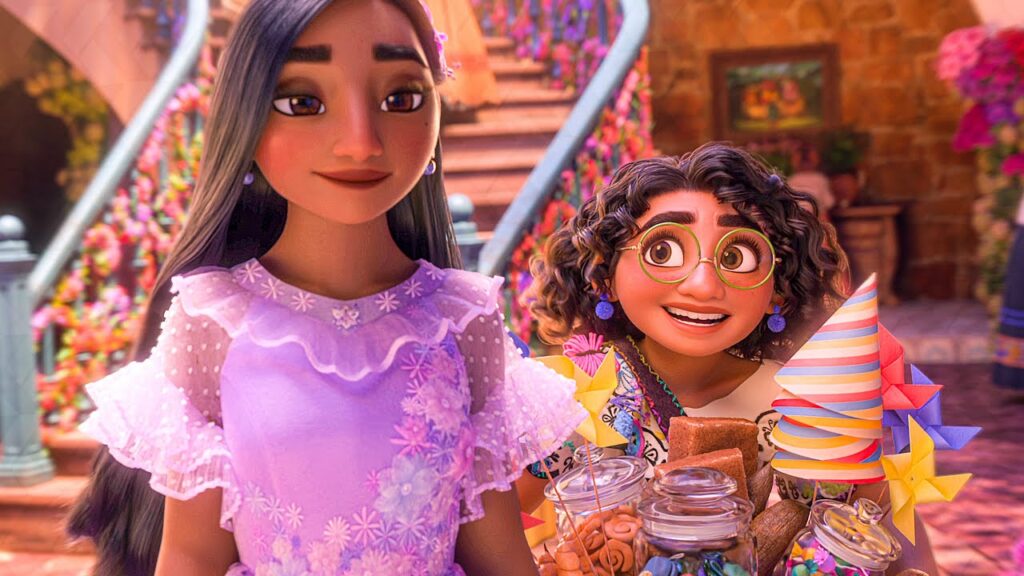
Not that Mirabel has time to fret about political equality; she has her own problems. Specifically, she’s the Madrigal clan’s black sheep, though her outsider status is less a matter of active rebellion than unfortunate circumstance. Whereas everyone else in the family possesses a special gift—her mother (Angie Cepeda) can heal people with food, her sister Luisa (Jessica Darrow) can lift pianos like they’re feathers, her other sister Isabela (Diane Guerrero) can wreathe flowers from thin air, and so on—Mirabel is frustratingly, singularly ordinary. This hasn’t dampened her buoyancy; to the contrary, she seems perfectly content despite her lack of a special skill, and she opens the film shepherding her young cousin toward his own initiation ceremony (where he’s scheduled to receive his particular gift) without any apparent jealousy or ill will. Nevertheless, one can sense a measure of existential despair on Mirabel’s part, a slight crack in her sunny disposition that quickly metastasizes as a literal crack in the floorboards of her beloved house.
That house, with its glowing doorways and hidden crawlspaces, is Encanto’s most quietly wondrous innovation. Much like the magic carpet in Aladdin, it’s somehow sentient without being anthropomorphized, conveying thought and emotion via swinging cabinets, bursting drawers, and moving stairs. It looks like a marvelous place to grow up, and the inexplicable dissipation of its invisible magic—a disturbing leakage which Alma harshly attributes to Mirabel’s meddlesome nature—provides the movie with its excuse for Mirabel’s pleasantly predictable journey of discovery and redemption. It is hardly a spoiler to remark that, over the course of the picture, she will face trials both external and internal—a dangerous pilgrimage across a desolate plain, an even more frightening mission of sisterly reconciliation—all the while demonstrating the thematic value in being spectacularly unspectacular.
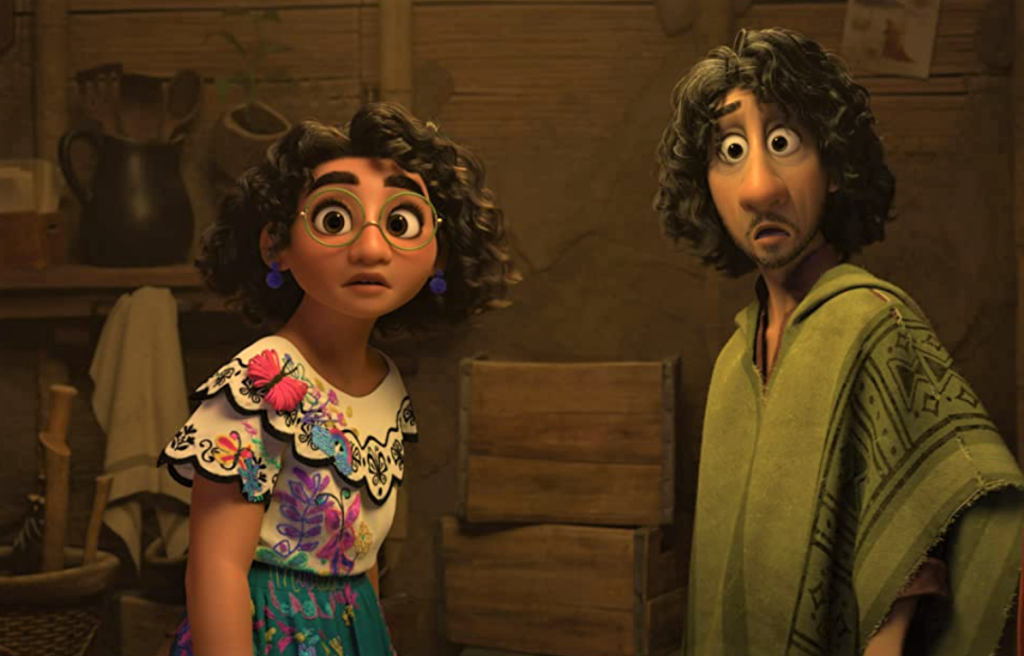
Which is a fair assessment of Encanto’s charms as well. As another tale of familial conflict and loyalty, it hardly shatters cinematic norms, but it sketches out new pages in the Disney playbook with color and flair. Its overall aesthetic is both warm and precise, with the characters’ faces and costumes flecked with just the right degree of punctilious detail. (Mirabel, with her olive-green glasses and messy hair, represents a welcome variation from the standard princess archetype.) The songs, by reigning Mouse House guru Lin-Manuel Miranda, are playful and robust; they’re too busily cacophonous to work as sing-along anthems, but they’re giddily enjoyable in the moment. (My favorites are probably “The Family Madrigal”, which introduces the characters with a blizzard of rhythmic exposition, and “We Don’t Talk About Bruno”, which probes the misdeeds of Mirabel’s prophesying uncle.) The plot is spare without being flimsy, delivering a few silent flashbacks with impressive economy. The set pieces are smartly choreographed, in particular a very funny sequence at a dinner table in which a secret spreads like wildfire, inching ever closer to ignition. And while the life lessons of the third act don’t entirely synchronize with the movie’s blurry mythology, the climax still resonates thanks to its Colombian setting, with a lovely final tune performed entirely in Spanish.
“Maybe your gift is being in denial,” a cherub suggests to Mirabel early in the film. But with its bright colors and confident storytelling, Encanto is entirely comfortable in its own skin—a delightful movie with nothing left to prove.
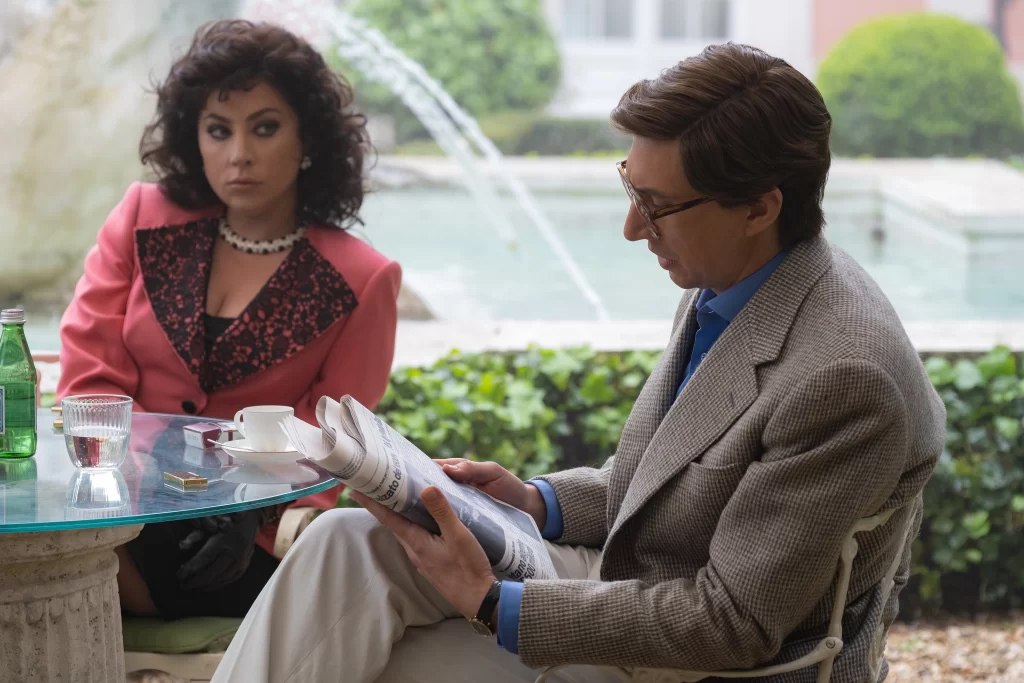
If Encanto is a simple story told well, House of Gucci is a squalid story told dully. It’s equally familiar, though—a Goodfellas-esque rise-and-fall narrative about the titular titans of fashion. This is relatively new territory for the protean Scott, though one could fairly characterize his newest film—his second of 2021, following The Last Duel—as a cousin to American Gangster, only absent any moral center whatsoever. Scott has directed all sorts of pictures over a very long and mostly productive career—science-fiction yarns (The Martian, Alien: Covenant), historical epics (Gladiator, Robin Hood), gritty thrillers (Body of Lies, The Counselor), intricate dramedies (Thelma & Louise, Matchstick Men)—so it was intriguing to wonder what specifically attracted him to making a movie about design icons. 157 jumbled minutes later, I’m still wondering.
Honestly, that’s not quite fair. In its bold strokes, the script for House of Gucci, which Becky Johnston and Roberto Bentivegna adapted from a book by Sara Gay Forden, provides the kind of juicy pulp that would naturally appeal to a genre craftsman like Scott: decadent wealth, back-stabbing betrayals, clumsy assassinations, absolute power corrupting absolutely. Yet the movie, which chronicles 20-odd years of ascension and manipulation, is oddly lacking in style or verve. There are some appropriately garish outfits and the requisite period hits on the soundtrack (“Heart of Glass,” “Blue Monday”), but the execution is otherwise strangely dutiful. Scott may be following the Scorsese blueprint, but he supplies neither thematic force nor visual élan.
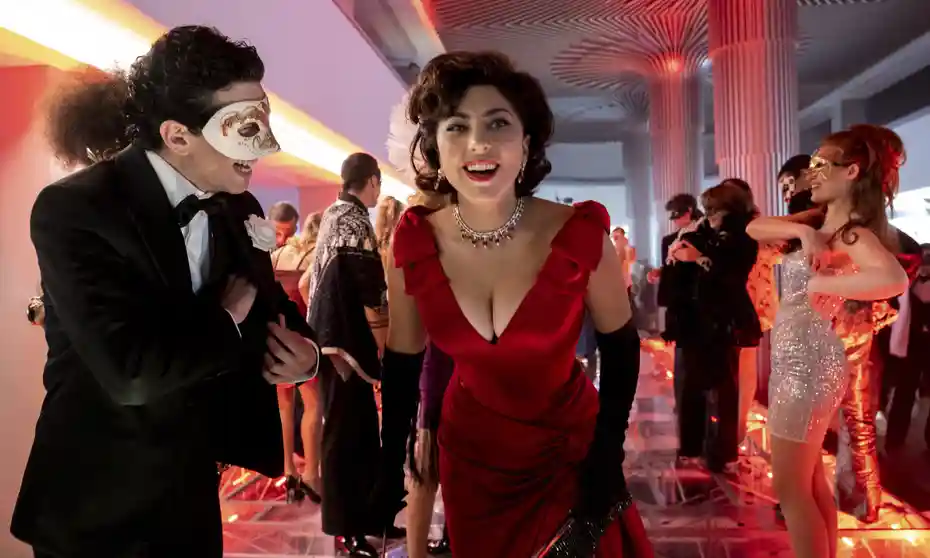
He certainly isn’t interested in the particulars of the fashion world itself; despite the late appearance of Tom Ford (Reeve Carney) and a supposedly successful runway parade, House of Gucci offers no insight into the brand’s preeminence in haute couture. That’s fine, as the characters’ chosen industry is less important than their consistent depravity. The film’s opening act feints toward a boisterous love story, as Patrizia Reggiani (Lady Gaga) and Maurizio Gucci (Adam Driver) meet cute at a party, where she first mistakes him for the bartender, then eyes him, in his slim-fitting tux, like a hungry cat stalking an oblivious, exalted mouse. Their fiery romance—you know they’re hot for each other because they have sex in the office, and up against a wall no less—isn’t without its costs; one mention of the Reggiani family’s lowly trucking business, and a pall of disapproval falls across the face of Maurizio’s father, Rodolfo (Jeremy Irons), like a shroud. But they’re smitten, and so when Rodolfo threatens to write Maurizio out of his will, the scion cheerfully accepts his disinheritance. Only poverty isn’t in the cards for Patrizia—often literally, as she increasingly relies on the advice of an opportunistic medium (a sleepy Salma Hayek)—and she begins to plot her husband’s reentry into the Gucci empire with the help of his uncle, Aldo.
Aldo is played, with delicious delirium, by Al Pacino—an actor of Italian heritage, as he’s only too eager to remind you. When making The Last Duel, Scott refused to require his actors to deploy French accents. For House of Gucci, suffice it to say he’s taken a different approach; the film is full of exaggerated vowels and drawn-out syllables. The showy caterwauling can be distracting, but it also loosens things up a bit, underlining the essential silliness of the material.
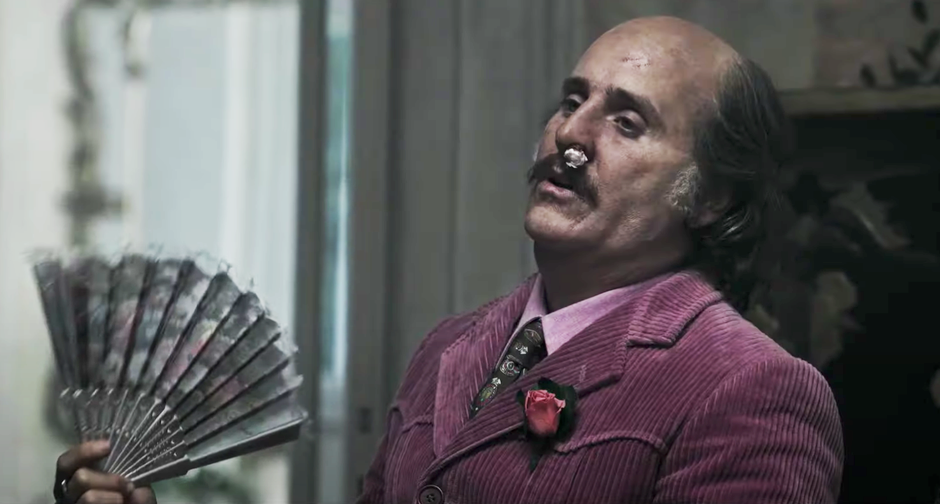
Yet the movie never properly embraces its demented underpinnings. It’s instead tediously straightforward, a predictable progression of corporate wrangling, cigar-smoke-choked negotiating, and crude scheming, as petty jealousies mushroom into horrific crimes. There are moments of cutting cruelty, as when Rodolfo viciously dismisses the design ideas of his dimwitted nephew (Jared Leto, making Pacino look positively sedate by comparison) as the work of entrenched mediocrity. But House of Gucci is itself boringly mediocre; it’s neither campy nor sincere, and the flat middle ground it occupies fails to justify its extravagant length.
What partially redeems the movie—what makes it memorable as well as awkward—is the quality of its acting. Then again, “quality” isn’t quite the right word, as the performances do little to deepen the characters. But Gaga, Pacino, and especially Leto all deliver hammy, go-for-broke turns that create sparks of madcap glee, even as they chafe against Scott’s glum professionalism; Pacino’s extended shriek of rage in the wake of his son’s bad decision is alone admission-worthy, while every scene with Leto feels like an experiment in how far he can push the screen before it shatters from ostentatious effort. They have their fun at the expense of Driver, who’s already given two excellent performances this year—one in The Last Duel, the other in Annette—but who seems rudderless here, uncertain how to calibrate Maurizio’s capricious shifts in mood and ambition while still trying to maintain an emotional authenticity that the remainder of the cast happily disregards. While everyone else is having a party, he’s stuck holding the embossed, ultimately empty bag.
Encanto grade: B+
House of Gucci grade: C+
Jeremy Beck is the editor-in-chief of MovieManifesto. He watches more movies and television than he probably should.
